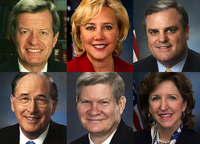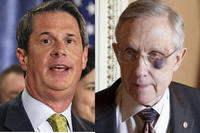-
Tech companies, telecoms clash over cybersecurity executive order
Last August a cybersecurity bill died in Congress amid partisan bickering. On 12 February this year, President Obama packed many of that bill’s elements into a cybersecurity executive order. To make the order more acceptable to some of its congressional and industry critics, the president introduced an exemption which would take large technology companies off the list of companies subject to the new cybersecurity standards. This exemption placated some of the original cybersecurity bill’s critics, but angered others, chief among them telecommunication companies.
-
-
U.S. nuclear industry resists stricter, post-Fukushima safety measures
Since the March 2011 Fukushima disaster, members of the Nuclear Regulatory Commission (NRC) have been debating whether or not to impose even stricter safety measures on the thirty-one U.S. boiling water reactors (BWRs). Utility companies have been fighting any new safety regulations, arguing that the security measures they have are more than enough.
-
-
Harvard president issues a clarion call for science
Harvard President Drew Faust, addressingthe annual meeting of the American Association for the Advancement of Science (AAAS), called for members of the scientific community to “raise our voices” in an effort to prevent the U.S. Congress from becoming “an American Association for the Retreat of Science.” Urging widespread efforts to prevent U.S. cuts in funds for sustained research, Faust said: “We must secure the federal research support critical to the future of our nation and of the world.”
-
-
Senate Judiciary Committee launches immigration hearings
Wednesday’s Senate Judiciary Committee hearing featured testimony from DHS secretary Janet Napolitano and Jose Antonio Vargas, a former journalist who started the group Define American, which campaigns for immigration reform. The hearing focused largely on border security and enforcement, with an entire panel devoted to just one witness — Napolitano. Napolitano said that border security was often used as an excuse to prevent meaningful changes.
-
-
Gang of Eight: DHS secretary to determine if border is secure

Even supporters of immigration reform admit that security along the U.S.-Mexico border should be improved so that legalizing the status of the eleven million undocumented immigrants currently in the United States would not become a magnet for drawing even more undocumented immigrants into the country. How do we know, however, whether the border is secure enough for the legalizing process to begin? A bipartisan group of senators, known as the Gang of Eight, has an idea: under the terms of the bipartisan framework for immigration reform, DHS secretary Janet Napolitano would make the final determination about whether or not the border is secure. Once she makes the determination that the border is secure, the eleven million undocumented immigrants would start on their path to a legal status in the country.
-
-
Labor unions join campaign for immigration reform
The immigration reform debate continues to grab the headlines, and labor unions are now entering the ring, hoping that organizing immigrant workers can boost the unions’ shrinking ranks.
-
-
Some Democrats face a tough choice on gun control measures

As the gun control debate continues, and different proposed bills are being considered on the Hill, Democrats in red states are facing a tough decision, as their support for gun control measures may become a drag on their re-election prospects in the 2014 congressional elections.
-
-
Contours of Hill gun debate emerge
Two issues have emerged as central to the debate over post-Sandy Hook gun control legislation: the first is banning the sale of assault weapons and limiting the size of magazines, the second is requiring a universal background check to make sure those who buy guns are responsible and stable enough to handle them. Hill observers say that a bill requiring universal background check, if carefully drafted to address the concerns of those who live in rural areas, may pass, as would legislation to limit the size of magazines. Banning the sale of assault weapons may be more difficult.
-
-
U.S. tech companies hope visa reform for high-skilled immigrants is near
U.S. technology companies hope that what appears to be a more bi-partisan approach to immigration reform will not overlook the need to address the issue of high-skilled immigrants. The current number for H-1B visas fir skilled immigrants is 65,000 a year. “A 65,000 starting point is just not feasible for this economy. That’s the same number we started with in 1990, when the economy was one-third the size it is today,” say a high-tech industry representative.
-
-
Bipartisan group of senators offers sweeping immigration reform

A bipartisan group of eight senators yesterday unveiled a proposal to overhaul the U.S. immigration system, a proposal which will form the basis of a bill that its backers hope to introduce to the Senate by March. Today, President Barack Obama is delivering a major speech on immigration in Nevada, and White house sources say that the specific proposals in his speech will dovetail with the senators’ proposal.
-
-
Lawmakers propose bill which would increase visas for highly skilled immigrants
Four senators plan to introduce a more narrowly tailored immigration reform bill which focuses on increasing the number of temporary visas available for highly skilled immigrants. The bill would also free up green cards so more of these highly skilled immigrants could settle in the United States and eventually become citizens.
-
-
House approves $50.7 billion Sandy relief bill
The House Tuesday night approved, by a vote of 241 to 180, the $50.7 billion in a Sandy relief package, the second installment of a $60.4 billion package requested by the White House and approved by the Senate (last week the House approved the $9.7 million flood-insurance part of the package). Effort by conservative members of the House to offset a part of the bill’s cost with across-the-board federal budget cuts failed on a 258-162 vote.
-
-
Obama on Wednesday will outline executive action to curb gun violence
President Obama on Wednesday will outline steps the administration can take without congressional approval to curb gun violence in the United States. Vice President Joe Biden told congressional leaders that there are nineteen separate actions the administration can take by using executive power. The president will emphasize that these executive measures are not an alternative to legislative action, and he will also announce his plan to push through Congress the most comprehensive reform of gun laws in two decades.
-
-
Sen. David Vitter (R-La.) calls Sen. Harry Reid an "idiot” over Katrina comment

Last week, during a floor debate in the Senate on the $9.7 billion portion of the Sandy relief measure, Majority Leader Harry Reid (D-Nevada), who supported the measure, said: “The people of New Orleans and that area, they were hurt, but nothing in comparison to what happened to the people in New York and New Jersey”; in response, Sen. David Vitter (R-Louisiana) said: “Sadly, Harry Reid has again revealed himself to be an idiot”
-
-
Congress approves first part of Sandy relief measure
Congress approved a $9.7 billion Sandy aid package last Friday after a two month delay; the delay was caused by fiscal cliff talks, warnings of federal funds cutbacks, and controversy over millions of dollars in unrelated projects; in two weeks, Congress will vote on the second part — an additional $50 billion Sandy relief package
-
- All
- Regional
- Water
- Biometrics
- Borders/Immig
- Business
- Cybersecurity
- Detection
- Disasters
- Government
- Infrastructure
- International
- Public health
- Public Safety
- Communication interoperabillity
- Emergency services
- Emergency medical services
- Fire
- First response
- IEDs
- Law Enforcement
- Law Enforcement Technology
- Military technology
- Nonlethal weapons
- Nuclear weapons
- Personal protection equipment
- Police
- Notification /alert systems
- Situational awareness
- Weapons systems
- Sci-Tech
- Sector Reports
- Surveillance
- Transportation
Advertising & Marketing: advertise@newswirepubs.com
Editorial: editor@newswirepubs.com
General: info@newswirepubs.com
2010-2011 © News Wire Publications, LLC News Wire Publications, LLC
220 Old Country Road | Suite 200 | Mineola | New York | 11501
Permissions and Policies
Editorial: editor@newswirepubs.com
General: info@newswirepubs.com
2010-2011 © News Wire Publications, LLC News Wire Publications, LLC
220 Old Country Road | Suite 200 | Mineola | New York | 11501
Permissions and Policies
